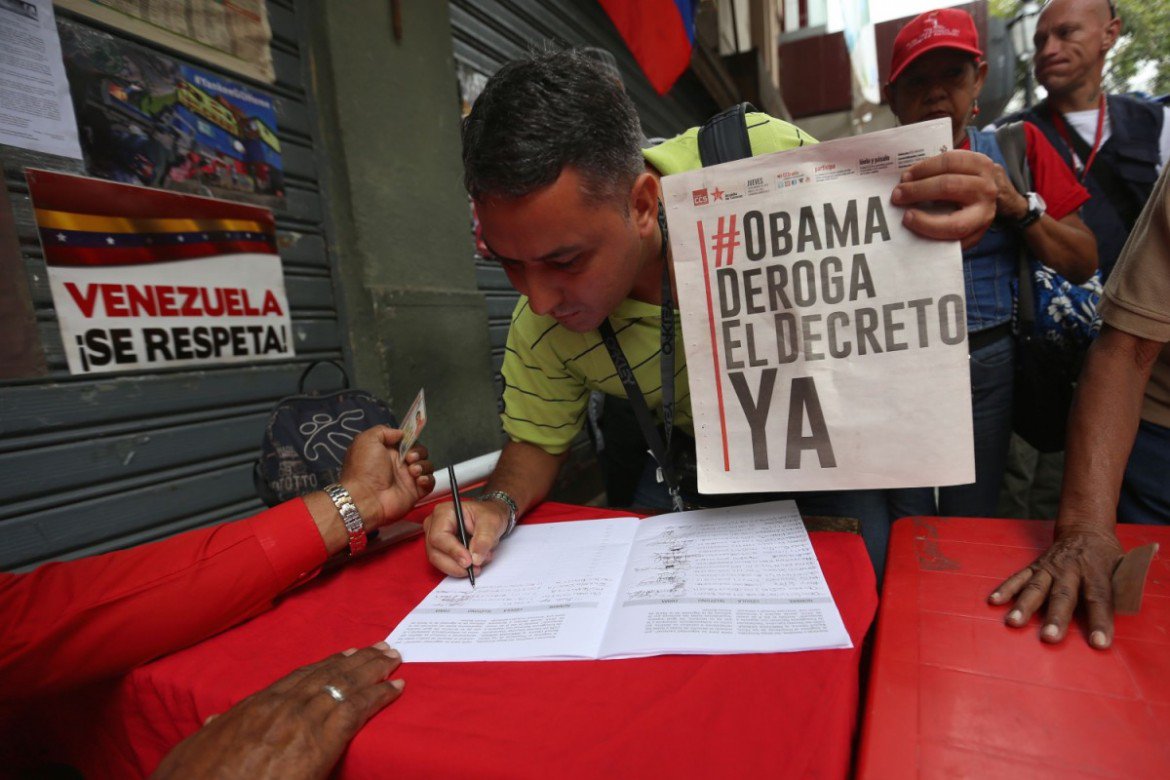Latin America
U.S. sanctions against Venezuela draw thousands onto Caracas streets
After President Barack Obama renewed sanctions against Venezuela, the government organized protests this weekend against U.S. attempts to break South-South alliances.

Thousands of Venezuelans mobilized this weekend against U.S. President Barack Obama’s decision to renew sanctions against the socialist-ruled country for another year, describing the South American oil power as “an unusual and extraordinary threat to the security of the United States and its foreign policy.”
Similar demonstrations are taking place throughout the continent, on the right and left, as conservative movements attempt to undermine the socialist gains made since Venezuelans elected Hugo Chavez in 1998.
“We are a hope, not a threat,” read one sign on Saturday. The protesters, led by President Nicolas Maduro, were resuming a campaign from last April that presented over 14 million signatures against the sanctions to Obama at the Summit of the Americas in Panama. The U.S. president faced opposition from many Latin American countries that rejected the administration’s attempt to isolate Caracas and to break up new South-South alliances.
That day was reminiscent of a day in 2005, when at the fourth Summit of the Americas Chavez shouted down President George W. Bush, who was promoting a Free Trade Agreement for the Americas. That, too, was an attempt to break up alliances and exclude Cuba, and Latin American opposition stalled the deal.
For socialist leaders in Latin America, the waters are choppy, driven by the conservative wave that disrupted the balance of two key countries: Argentina, with the (measured) victory last year of President Mauricio Macri, and Venezuela, where the center-right won a large parliamentary majority.
New trade agreements raise the stakes. The historic Trans-Pacific Partnership (TPP) links the U.S. with Mexico, Chile and Peru, and there’s been a proliferation of agreements between individual progressive countries and the European Union (which is for a Transatlantic Trade and Investment Partnership). Now, enemy No. 1 in Latin America is Chavista Venezuela, which holds the largest oil reserves in the world and the second-largest in gold, and which directs — even with its spiraling economy — more than 60 percent of its revenue to social programs.
Because of this, there is a renewed interest in Cuba. Western powers hope that new trade agreements between Cuba and the U.S. and the E.U. will impact the Integral Cooperation Agreement, established in 2000, that tied Cuba and Venezuela across a wide range of sectors, particularly energy.
In light of this, Raul Castro on Saturday wanted to send a clear message. As Europe was announcing a new agreement with Europe, Castro was meeting in Havana with the Venezuelan Minister of Foreign Affairs. The two renewed their bilateral engagement and strengthened the privileged relations between the countries. Caster repeated his rejection of the sanctions and expressed the “unconditional support of the Cuban people to the Venezuelan people and the government of Nicolas Maduro.”
He also renewed his support for the civic-military union (the alliance between the Bolivarian armed forces and the government), which characterizes the Venezuelan state. The alliance — as other progressive presidents of the region have emphasized — exists not to attack, but “to maintain the peace, constitutional order and the gains of the Bolivarian revolution.”
Cuba is one of 120 countries that have opposed the renewal of Obama’s sanctions Executive Order 13692 against Venezuela. Earlier this month, Castro had asked for its elimination, highlighting that Venezuela has favored the safety and welfare of the country’s disadvantaged sectors and people, as well as its army, which is put to use for social purposes and not aggression and which couldn’t possibly be a threat to the U.S. In addition to the ALBA countries, the Group of Non-Aligned Countries is against the decree.
Obama’s Latin America trip — first to Cuba on March 20 and then to Argentina — is part of a road map that aims to restore political control in the region and pave the way for ratification (in individual parliaments) of the agreements made with the TPP, including those countries on the continent (like Argentina) that aspire to follow the way of Mexico, Chile and Peru.
Washington’s agenda runs parallel to that of the Venezuelan right, which has recently begun a process to oust Maduro, whose birthplace is in question, before the end of the mandate. Because the parliament is just one of the five powers in balance in the Bolivarian Republic, the conservative parties are seeking to organize a mid-term referendum.
In order to obtain the necessary support — 10 percent of electors must request a mid-term consultation — they’re mobilizing demonstrators in the streets, collecting signatures and even seeking a constitutional amendment to reduce the six-year term of Venezuelan presidents.
Originally published at http://ilmanifesto.info/caracas-in-piazza-contro-il-decreto-obama/ on 2016-03-13
